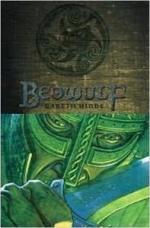|
|
Beowulf Author/Context
Beowulf is an epic poem composed somewhere between the middle of the 7th and the end of the 10th century A. D., about four centuries before the Norman Conquest. Composed in Anglo-Saxon/Old English, yet set in Scandinavia, it recounts the deeds of a Scandinavian prince (Beowulf) and reflects the world of 6th-century Geats, Danes and Swedes, who were rigidly feudal, highly civilized, violent, and also newly Christian. Beowulf's actual composition is dated at around the 8th century, because of its high degree of Christian content, paralleling the time of England's conversion from paganism to Christianity. It has also been suggested that the monks who copied Beowulf may have also inserted certain degrees of Christian morality into its text.
Consisting of 3,182 lines in verse, its author is unknown and believed to have been a medieval poet or scop, who wrote down the poem's events. The poem was probably carried from generation to generation through a spoken retelling, as Old English verse was traditionally heard rather than read, its audience being mostly illiterate. The events, set in a pagan Germanic society governed by a heroic code of honor, would have been familiar and pleasurable to its listeners. Many of the events are legendary and bear similarities to other Germanic historical and mythological literature in Old English, Norse and German.
The text of Beowulf exists in just one manuscript copy, which rests in the British Library in London. This 10th-century manuscript was probably copied by a late medieval monk and stored in monasteries, until their destruction and dissolution by King Henry VIII. Several 17th and 18th-century scholars, including Lawrence Nowell and the Danish Thorkelin, preserved the manuscript, although after much deterioration and a fire, much of the text was lost and left unreadable.
The revised A Handbook to Literature defines an epic poem as:
"A long [heroic] narrative poem in elevated style presenting characters of high position in a series of adventures which form an organic whole through their relation to a central figure of heroic proportions and through their development of episodes important in the history of a nation or race."
Epic poems tend to have certain common characteristics, including a "hero [who] is a figure of heroic stature...or legendary significance, [a] setting vast in scope, action consist[ing] of great deeds of great valor or requiring superhuman courage, supernatural forces-gods, angels, demons..., a style of sustained elevation and grand simplicity..., and finally [an] epic poet [who] recounts the deeds of his heroes with objectivity."
Margaret Drabble in The Oxford Companion to English Literature says, "Beowulf is the most important poem in Old English and it is the first major poem in a European vernacular language,...remarkable for its sustained grandeur of tone and for the brilliance of its style."
Bibliography
Anonymous, Beowulf., Trans. Seamus Heaney. London: Faber & Faber, 1999. ix-xii.
Anonymous, Beowulf: A New Translation with an Introduction by Burton Raffel., Trans. Burton Raffel. New York: Mentor/Penguin Books, 1963. ix-xvi.
Drabble, Margaret. The Oxford Companion to English Literature. New York: Oxford UP, 1985. 90.
Thrall, William Flint, and Addison Hibbard and C. Hugh Holman. A Handbook to Literature. New York: The Odyssey Press, 1960. 174-175.




